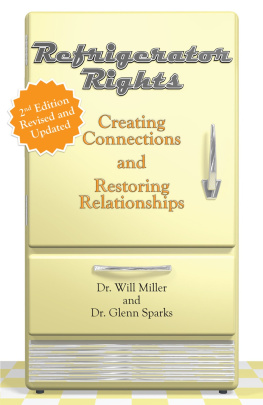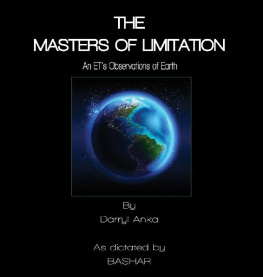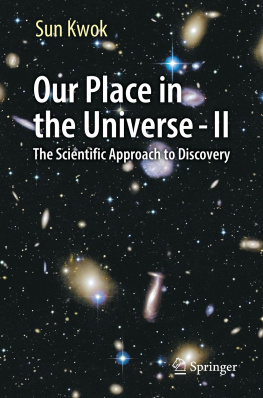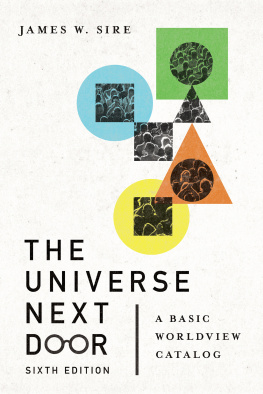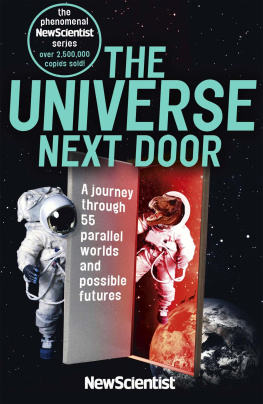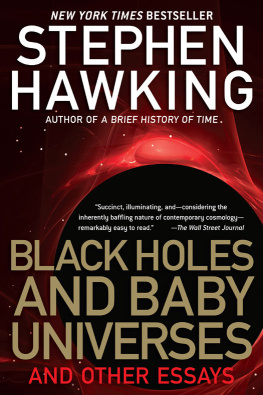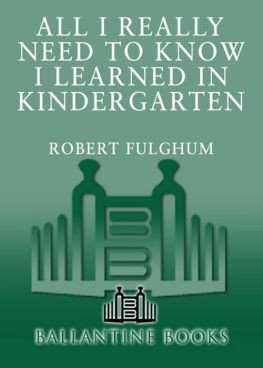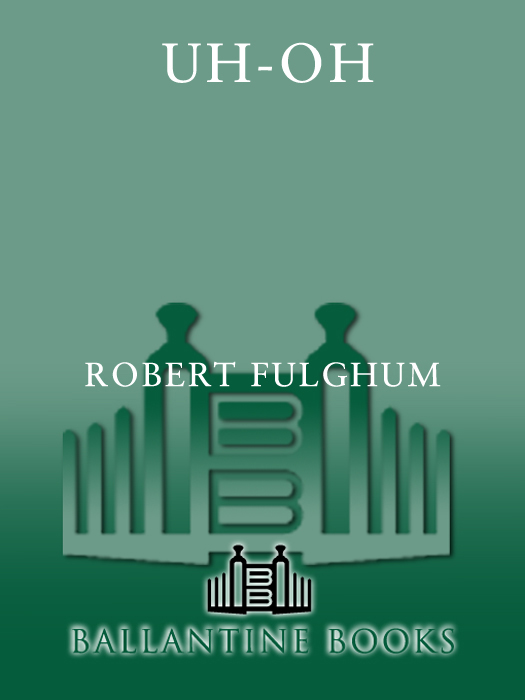
BRIEF, WITTY,
DOWN-TO-EARTH
The simple clarity of Fulghums vision and the universality of his themes have obviously touched a responsive chord.
The Seattle Times
Fulghum celebrates the ordinary and encourages his readers to seek holiness in the seemingly mundane. Fulghum communicates the wonder-and-awe of time, love, and human potential with authenticity and feeling. His observations are so common, yet his emotions so genuine, that we spot him as The Real Thing.
San Francisco Chronicle
Weddings always bring out the best in Fulghums storytelling. As do funerals. His recounting of the cemetery clash between bereaved Old Lady Hogaboom and the Veterans of Foreign Wars is worthy of Jean Shepherd. Its nice that there are people like Robert Fulghum in our world. Maybe they can even make it a better place.
Chicago Sun-Times
Perceptive Fulghum endeavors to transform the commonplace into the transcendent.
The Cleveland Plain Dealer
A raid on Fulghums fridge is worth the trip. There is much on those shelves to nourish both mind and body.
Houston Chronicle
THIS NEW COLLECTION IS
A JOY.
Chattanooga News-Free Press
An enlightening, uplifting experience. UH-OH is a book to be treasured and shared. This is a book to be read aloud to someone you have known for a long time and with whom you share a lifetime of memories. It will generate quiet chuckles, belly laughs, and perhaps a few tears, as Fulghum subtly weaves a theme of balance between the mundane and the holy, between humor and grief, between what is and what might be.
Tulsa World
Fulghum specializes in the celebration of the everyday event, the little domestic epiphany, the miracle of meadoaf, the cosmic significance of jelly beans, the fickle finger of fate. Sort of a cross between Norman Rockwell and Kahlil Gibran, but funnier.
Toronto Globe & Mail
A welcome gem of wisdom to be remembered with delight [Fulghum is] a casual writer with a marvelous gift for finding the universal in the simple and trivial.
The Anniston Star
Fulghum has a kind of no-nonsense, heres-looking-at-you approach that is appealing. He is a man of the neighborhood, aware of lifes pitfalls and foibles, and the parables he creates are honest and believable.
The Portland Oregonian
DOWNRIGHT IRRESISTIBLE
Not liking Robert Fulghums third bestseller, UH-OH, would be similar to not liking Frank Capras Its a Wonderful Life.
Lexington Herald-header
Simple, from-the-heart His stories are funnier than ever. Fulghums message, if boiled down, seems to come to this: Stop and smell the roses while you can; live life; be yourself; and never lose your sense of wonder, awe, and humor. Millions of Americans whove read All I Really Need to Know I Learned in Kindergarten and It Was on Fire When I Lay Down on It seem to find a warm refuge in layman philosopher Fulghums comforting words. Whos to say a third dose wont do the same?
The State (Columbia, SC)
UH-OH is fast, easy reading and a book that can be put down and picked up again for quick-reading periods. It makes a good addition to the bedside table.
Baton Rouge Magazine
Philosophic joy. From meat loaf to the Salvation Army band, from fireflies to funerals, from hiccups to a watch without hands. The man writes with balance and humor.
The Staten Island Sunday Advance
Fulghums experiences and those of others amuse, teach, and even provoke tears in readers who are tuned in to his inspired observations.
Publishers Weekly
By Robert Fulghum
Published by The Random House Publishing Group
ALL I REALLY NEED TO KNOW I LEARNED IN
KINDERGARTEN
IT WAS ON FIRE WHEN I LAY DOWN ON IT
UH-OH
MAYBE (MAYBE NOT)
FROM BEGINNING TO END: The Rituals of Our Lives
Books published by The Random House Publishing Group are available at quantity discounts on bulk purchases for premium, educational, fund-raising, and special sales use. For details, please call 1-800-733-3000.
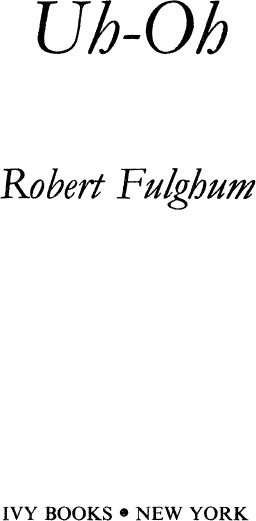

U H-OH IS NOT IN ANY DICTIONARY OR THESAURUS , and is seldom seen in written form. Yet most of us utter that sound every day. And have used it all our lives.
Uh-oh is one of the first expressions a baby learns.
Uh-oh, or something like it, has been used as long as people have existed. And it may be the first thing Adam said to Eve after he bit into the apple.
She knew exactly what he meant, too.
Across the history of the human family, millions and millions of distinct sounds have come and gone as we continually reach for ways to communicate with one another. Often, the most expressive words we use are not words at all, just those shorthand sounds that represent complex thoughtsgrunts and moans and snorts and clicks and whistles compounded by facial expressions and physical gestures: Uh-huh no-no mmmnnn huh hey oops OK yo ah ha humpf and an almost endless number of others whose meaning and spelling cannot be conveyed with letters on paper.
Uh-oh is way up near the top of a list of small syllables with large meanings.
We say uh-oh to a small child who falls down or bumps his head or pinches his finger. It means that we know the child hurts, but we also know the hurt is temporary and that the child has the resources to handle the hurt and get up and go on about his business. As the child learns, he will not need to turn to a parent to kiss-it-and-make-it-well each time he scrapes himselfhe will know where to find the bandages on his own. Uh-oh is the first wedge in weaning a child away from us into independence.
The older we get, the more experience and knowledge we have, the more able we are to distinguish momentary difficulty from serious trouble. The more we know that something is uh-oh, not 911.
If I had a chest pain, I might go to an emergency room thinking Oh my God, heart attack! If my doctor had the same symptoms, she might think, Uh-oh, gas pains, take an antacid, and go on with her work.
What to me is the last gasp of my old truck is a repairable electric problem to my mechanic. Uh-oh, theres a short in your ignition wire.
One might even come to feel the same way about things that cannot be fixed. From the cradle we know about Rock-a-bye-baby and what happens when the bough breaks. In kindergarten we are reminded about these conditions. All the kings horses and all the kings men could not put Humpty Dumpty together again. Im familiar with death, having been around it often in hospitals and cemeteries. If I see my own death coming, my response may well be uh-oh.
Uh-oh in this sense is a frame of mind. A philosophy.
It says to expect the unexpected, and also expect to be able to deal with it as it happens most of the time. Uh-oh people seem not only to expect surprise, but they count on it, as if surprise were a dimension of vitality.
Uh-oh embraces Here we go again and Now what? and You never can tell whats going to happen next and So much for plan A and Hang on, were coming to a tunnel and No sweat and Tomorrows another day and You cant unscramble an egg and A hundred years from now it wont make any difference.


